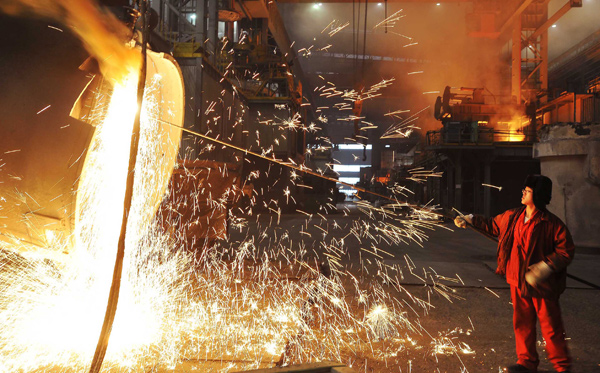作者:胡家勇 来源:《中国日报网》 时间:2017-8-9
2017年8月9日,《中国日报网》评论版刊发中国社会科学院经济研究所胡家勇研究员的文章《Reforms pave way to sustainable future》,全文如下:

A worker cleans a steel lendle at the Dongbei Special Steel Group in Dalian, Liaoning province. LIU DEBIN / FOR CHINA DAILY
The Third Plenary Session of the 18th Central Committee of the Communist Party of China in November 2013 decided to deepen reform in an all-round way, in order to develop socialism with Chinese characteristics and promote the modernization of China's governance system and governance capacity.
It is clear by now that China has comprehensively implemented reforms in the economic, political, social, cultural and environmental fields, as well as in the construction of the Party and the military.
The main goal of the economic reform is to strike the right balance between the government and the market, so that the market plays a decisive role in resource distribution while the government takes measures to improve governance.
The reform of the administrative evaluation and approval system, too, has proceeded smoothly, as 618 administrative evaluation and approval items have been cancelled or delegated to lower-level authorities. Besides, 323 intermediary services for administrative evaluation and approval, and 434 professional qualification licenses have been regulated. Also, the local authority power list, obligation list and negative list for market access have been established, and since 2014 government pricing of 80 commodities and services cancelled.
The reform of State-owned enterprises has been proceeding well, with central-level SOEs implementing reforms aimed at regulating capital. Fiscal and tax reforms, too, have deepened, and measures to replace business tax with value-added tax nationwide were taken on May 1 last year.
Thanks to the financial system reform, the renminbi has been included in the Special Drawing Rights basket of the International Monetary Fund, and the authorities have launched a development plan (2016-20) for inclusive finance so as to promote "green finance". As part of the urbanization reform, measures have been taken to help migrant workers to settle down in urban areas. And to boost the economy, 11 free trade zones have been established.
Moreover, the Belt and Road Initiative (the Silk Road Economic Belt and the 21st Century Maritime Silk Road), and international production capacity cooperation have made significant progress, and the BRICS New Development Bank and the Asian Infrastructure Investment Bank have started operation.
In the political field, the promotion of socialism with Chinese characteristics has achieved considerable success, and the judicial system reform has deepened.
As far as social reforms are concerned, education, healthcare, eldercare, employment and income distribution reforms have made remarkable progress. And in the cultural field, the production and management system have been further improved.
As for environmental protection, the eco-compensation system, the "river chief system" (total protection of rivers and lakes) and "national park (protection) system" have been implemented.
In terms of Party building, the anti-corruption mechanism has been strengthened with the aim of putting power in the cage of regulations.
The deepening reform has paved the way for sustainable social development and comprehensive social progress. China has maintained a medium to high growth rate despite the global economic downturn, and by the end of last year, its urbanization rate had reached 57.4 percent, up 4.8 percentage points compared with the end of 2012. The figure is likely to increase to 63 percent by the end of 2020.
From 2013 to last year, more than 13 million jobs were created every year, and the number of impoverished people declined by over 10 million a year. According to the poverty relief plan, China will become a moderately well-off society in an all-round way by 2020, which means all impoverished people will be lifted out of poverty by then.
With the main framework of deepening reform in an all-round way established, it is necessary to scientifically define the function and obligation of the government, so that the government and the market coordinate with and support each other. It is also important to establish an effective property right protection system, because the right to property is the basis of market economy. And a unified, open market system with orderly competition needs to be established to allow the free flow of key production factors nationwide, and guarantee market players equal access to production factors and the right to invest and do business freely.
(The author is a researcher at the Institute of Economics, Chinese Academy of Social Sciences.)
(原文见2017年8月9日《中国日报网》评论版)
关键词:Reform;the 18th Central Committee of the Communist Party;the government ;the market;the "river chief system"
原文链接: https://www.chinadaily.com.cn/opinion/2017-08/09/content_30381272.htm
